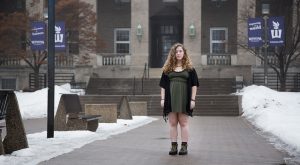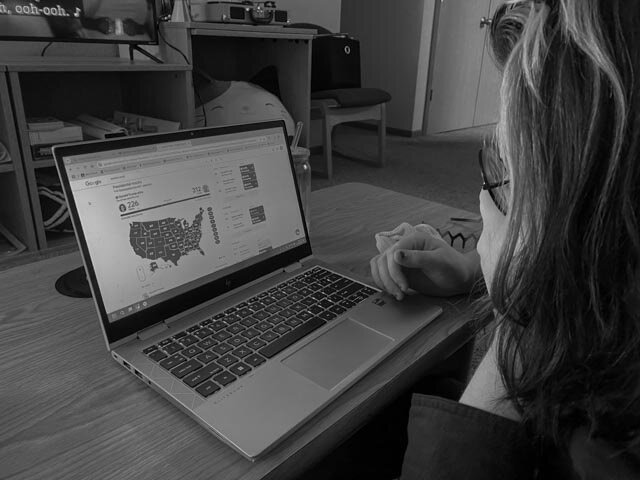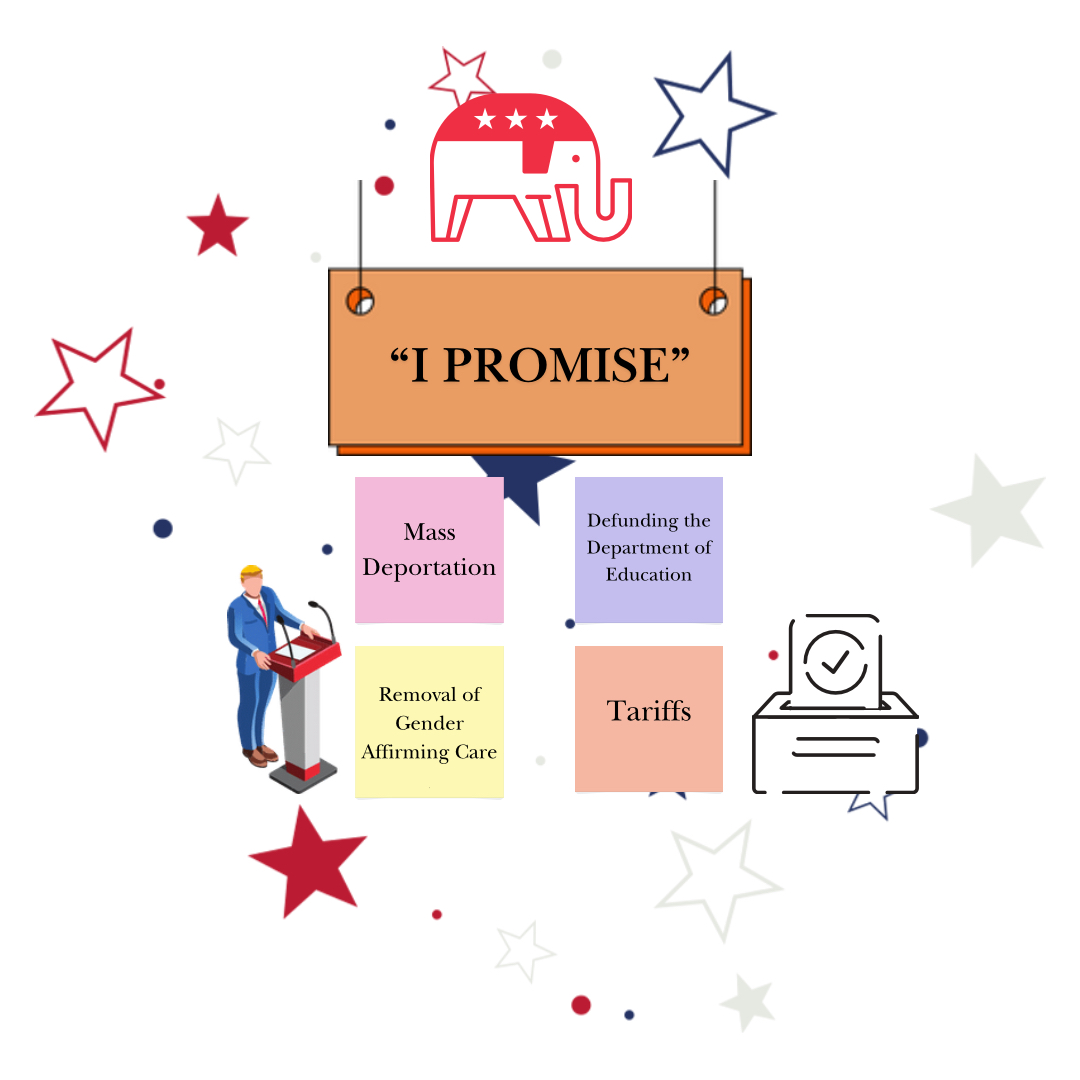Olivia Volkman-Johnson / Winonan

One in five women will be sexually assaulted while in college, according to a study by the U.S. Justice Department. Furthermore, according to the Rape Abuse and Incest National Network, every 98 seconds someone in the U.S. is sexually assaulted.
Winona State University is not immune to these statistics.
The following are stories from five women who attend Winona State and have been sexually assaulted—both on and off campus.
In her first year of college, Risa was celebrating the start of the spring semester at Winona State with some friends.
The next morning, she woke up in a hospital bed with no recollection of the night before and her good friend—also a Winona State student—sitting beside her. At the time, Risa did not know this friend had sexually assaulted her the night before.
That evening, a police officer called Risa and asked her if she remembered anything from the previous night. The officer then explained how he saw evidence of a sexual assault when he pulled her friend’s car over outside of Haake Hall.
Though initially shocked and dismissive of the officer’s suspicions, Risa explained she was grateful he intervened that night.
“If the police weren’t there, I probably wouldn’t have known of my assault today,” Risa said.
Although the officer’s initial assertion was that the perpetrator could be prosecuted, he informed Risa there was insufficient evidence while the DNA samples were being processed.
Since Risa was unable to press charges through the Winona Police Department, she reported her assault to Tamara Berg, director of the women’s, gender and sexuality studies department, and Winona State’s Title IX Coordinator Lori Mikl.
“…the university was the only entity that could hold the perpetrator accountable so I chose to speak up,” Risa said.
The Winona State decision board contacted Risa within three months, a full month later than protocol states sexual violence decisions are to be made. They informed her there was insufficient evidence that the perpetrator was in violation of the MNSCU Sexual Violence Policy.
“Despite the police report indicating that there was a used condom in the car, the school denied the fact that the perpetrator engaged in ‘any sexual contact with [me]’ on the night in question,” Risa said.
Berg encouraged Risa to write a letter to the board in the hopes of repealing the decision, but she received the same ruling just two days before spring commencement.
“Because the school was acting very slowly, that decision was made right before graduation, and he graduated from this university,” Risa said. “[He] walked free without being held accountable just like many other perpetrators out there.”
Eight months after the assault, a positive DNA result from the used condom on the perpetrator’s car led police to resume the investigation and conduct a trial. The perpetrator plead ‘not guilty’ and walked away without charges.
“Till the very end, he did not admit what he had done,” Risa said. “I’ve had to forget everything because nobody could prove that there was a sexual assault.”
After the result of the court case, Berg encouraged Risa to join the RE Initiative in order to heal and “use [her] experience to improve how the university deals with gender-based violence.”
Risa, now a senior, works with the RE Initiative and other peer advocates to educate Winona State students and faculty on sexual violence, including how and where to report it.
“[RE Initiative members] understand rape culture, they know what we need to do, and they are the people who want to change this culture,” Risa said. “Education is power. I will keep raising my voice to make a change and to end the persistent rape culture that validates and upholds gender-based violence and victim blaming.”
In the fall of 2015, Cassie was at a Welcome Weekend party at the Winona State chapter of the Tau Kappa Epsilon (TKE) fraternity.
She and a few friends found themselves “shoulder to shoulder” in the “jam-packed” TKE house where most people were drinking and dancing. Then the details got fuzzy and Cassie was unable to immediately remember that she was sexually assaulted that night.
“To this day, I’ve been told that there were drugs involved, which is why I don’t remember it,” Cassie said. “I still get flashbacks and pieces of information that I still don’t know if I trust.”
According to the University of Notre Dame, some side effects of date-rape drugs, which are used to incapacitate sexual assault victims, include “memory loss and confusion,” making it difficult to prosecute perpetrators who utilize them.
Cassie explained how she knows there were four men present during the assault that night at the TKE house, though she is unsure if these men were TKE members.
According to local news outlets across the nation, several TKE members have been found guilty of sexual violence and sexual misconduct.
As the fall semester continued, Cassie began to recall information about her assault and decided disclose it her friend, Kyler, who worked with the RE Initiative.
Later that spring, Cassie took part in Take Back the Night—an event held by Winona State’s women, gender and sexuality studies department and the Winona Women’s Resource Center—to share her story and meet with other survivors.
After speaking at Take Back the Night, Cassie met with Berg to learn more about the women’s, gender and sexuality studies department and to take steps toward reporting her assault to Mikl.
“It wasn’t until I met with Tamara where I felt that I was in the right place, because before I reported, campus treated me like absolute hell,” Cassie said.
Since Cassie could not remember most of the details of her assault, she explained there was little to nothing Mikl did to help.
“I talked to Tamara this fall about what they decided, if they were even going to look into the fraternity, and I didn’t hear anything at all,” Cassie said.
Cassie explained she was grateful for Berg’s support and encouragement while struggling with Winona State administration.
According to Cassie, several Winona State administrators—including the former associate Dean and current Dean of Liberal Arts Peter Miene, the Dean of Students Karen Johnson and the Director of Housing and Residence Life Paula Scheevel— discriminated against her due to her mental health state, which was exacerbated by the sexual assault.
As the result of an accidental medication interaction, Cassie was taken to the hospital in fall 2015 and was given a warning regarding the incident.
In a meeting to discuss her “bad behavior” during the winter, Cassie explained the housing director compared the incident to an alcohol violation, though it was an accident.
Cassie also felt mistreated when she was prevented from attending a communications studies class taught by department chair Amy Hermodson in spring 2016. She was subsequently forced to drop the course.
“I got an email from the chair of the department saying, ‘[You’re] not ready for this class,’ but she only determined that because she knew I was having mental health problems,” Cassie said. “Even though I pleaded my case…they still would not let me take that class. So, eventually, I just left the major because I was made so uncomfortable.”
Cassie’s mental health deteriorated due to the rejection and discrimination, and she attempted suicide, requiring an ambulance to bring her to the hospital. Soon after, she was evicted from the East Lake Apartments.
“The dean of students and the housing director came to me when I was in the hospital… and they told me then that I can’t live there because I’m a harm to myself,” Cassie said. “I was a liability. Because of my mental health, they kicked me out of my apartment.”
The dean of students contacted Cassie’s mother—without Cassie’s permission—to inform her that she needed to come and move Cassie out.
“I couldn’t find a place to live, so I emailed them saying, ‘I need more time. You need to give me more time.’ But then I got in trouble because I ‘disobeyed’ university officials,” Cassie said.
Now a fifth-year psychology major, Cassie has become increasingly involved with activist work on campus through the women’s, gender and sexuality studies department and the fight for our rights & gender equality club.
“There’s no way I’m ever going to get justice for what happened,” Cassie said. “So I’m just kind of on edge a lot, not feeling safe on this campus. But I’m still here, doing what I can, using my voice.”
When she was 15 years old, Alexis was dog sitting one night for her boyfriend who was out of state. At the time, she was struggling with depression, which, was only made worse by her mother’s recent hospitalization.
Since Alexis was feeling very emotional, an acquaintance who lived down the street offered to come over and keep her company. She initially started feeling better, but the evening soon turned grim.
“I had gone to let the dog outside, and he had followed me downstairs. And that’s when I started feeling weird,” Alexis said.
While Alexis was showing him where the bathroom was, the perpetrator—who was 18 years old at the time—lured her into another room and sexually assaulted her.
“Afterwards, he acted like nothing happened,” Alexis said. “He left, and I locked the door. And right before he walked out the door, he turned to me and told me that I couldn’t tell anybody because he would get in trouble.”
Alexis immediately texted her best friend and told her that she had been sexually assaulted. Alexis’ friend encouraged her to contact her boyfriend, who then contacted her mother. Eventually, Alexis’ father found out and prompted her to report the assault.
“He told me that he called the police, and they were on their way and basically told me that I didn’t have an option but to report,” Alexis said. “I begged him not to, but he told me that if I didn’t report, that [the perpetrator] could just go do it to other girls.”
Alexis ended up reporting the assault to the police and going to the hospital for STD and pregnancy tests. Afterwards, she went to the police station to give an officer a full report.
“[The officer] started out by telling me that he hated my perpetrator because he had worked on at least five other cases where my perpetrator sexually assaulted other women, but there wasn’t enough evidence,” Alexis said. “He told me that it was his personal goal to get him behind bars.”
A few months later, the perpetrator was convicted of statutory rape and sentenced to 90 days in jail. He was then released one month later for good behavior and became a registered sex offender.
Rumors began to spread around Alexis’ school and many of her peers believed she falsely accused the perpetrator of sexually assaulting her.
“The rumors spread around school that I was just a whore who was crying ‘rape’ because I had a boyfriend at the time,” Alexis said. “My boyfriend questioned everything and kept asking me, months afterwards, if I was just cheating and trying to cover it up.”
Alexis eventually lost all her friends at school as they believed it was “too hard to be friends” with her.
Once she came to Winona State, Alexis felt that she had started a “new chapter” in her life. But it took an unfortunate situation in order for her to open up to her new friends about her assault.
“I was at a party one time and someone had tried to make a joke about a girl being too drunk and getting taken advantage of,” Alexis said. “I freaked out and said ‘this is not a joke, this is real.’ And I just started telling people, like my close friends, after that.”
Though it was initially difficult, Alexis became more comfortable sharing information about her assault. Now a junior psychology major, she hopes telling her story will make a difference on campus.
“I just realized that if there’s going to be a change, people need to speak out,” Alexis said.
When she was 15 years old, Jacqueline and her best friend had gone to meet their boyfriends after a night of drinking. Soon after arriving at her boyfriend’s house, Jacqueline felt sick and he brought her up to his room to lie down.
“I’m trying to go to sleep and he tries to kiss me and tug on my clothes,” Jacqueline said. “He keeps asking me, ‘Do you want to have sex right now?’ and I’m like, ‘No I just want to go to sleep.’”
Jacqueline then blacked out while still feeling her boyfriend take off her clothes and sexually assault her. The next morning, Jacqueline tried to explain to her best friend what had happened.
“She accuses me of lying and says ‘No, you just regret having sex with him so you’re just saying that he raped you,’” Jacqueline said. “She just never believed me. Even today, she still doesn’t believe me.”
Jacqueline’s boyfriend told people they had sex, causing Jacqueline to lose most of her friends. She did not to tell the truth for fear of retribution.
“I didn’t want to get in trouble, so I never went to the police. I just suffered in silence because I didn’t have anyone to talk to.”
Once Jacqueline came to Winona State, she was able to start over. Then last spring, Jacqueline was at a party celebrating the end of the semester.
At the party, one of Jacqueline friends kept insisting that she drink more while pouring her several shots.
“[He] was literally forcing it down my throat,” Jacqueline said. “He was a really good friend, and I really trusted him.”
Soon Jacqueline was too intoxicated to go home and resolved to stay at the party. The party’s host encouraged her and a mutual friend to sleep in his room until she felt well enough to walk back.
“The guy who hosted the party started to come onto me and he was like ‘You know you want it. Don’t tell me you don’t want it,’” Jacqueline said. “I kept telling him ‘No, stop.’”
The perpetrator attempted to put his hands up Jacqueline’s skirt while she fought to stay awake. Eventually she screamed at him to stop, and her mutual friend woke up to help her.
Jacqueline left the next morning and hoped to find someone to talk to about the assault. Eventually, she was able to contact a good friend who encouraged her to report the assault, though she avoided reporting due to the fact that she and her perpetrator had many mutual friends.
At the beginning of the fall 2016 semester, Jacqueline—now a junior psychology major—found herself at another party hosted by her perpetrator, but decided not to drink for fear of being assaulted again.
“He ended up doing the same thing to a friend of mine,” Jacqueline. “I felt awful because I kept thinking, ‘If I reported it, it wouldn’t have happened.’ And I blame myself for it.”
Jacqueline then resolved to report her assault using Winona State’s online report form for sexual violence and misconduct.
“Two weeks later, I get an email back saying ‘I’m sorry, you have insufficient information, but here’s some counseling services,’” Jacqueline said. “And I’m thinking, ‘This isn’t going to help at all because he’s going to do it to someone else.’”
Jacqueline and her friend who was sexually assaulted by the same perpetrator plan to meet with Mikl this semester to file a more comprehensive report.
Though she feels frustrated that not enough has been done to reprimand her perpetrator, she is thankful for support she receives from her friends and housemates.
“It makes me feel a lot stronger that I have support,” Jacqueline said. “It’s so hard for me to talk about it, but at the same time, I know talking about it is going to help somehow.”
Jenn was a freshman in her second semester at Winona State and was enjoying the weekend with her friends. Throughout the night, a friend of a friend attempted to touch Jenn repeatedly.
“He would try to put his arm around me and touch my leg. It just made me feel really uncomfortable,” Jenn said. “I was like ‘Please don’t touch me.’ You don’t touch someone without consent.”
Jenn and her friends ended up going to a TKE party and soon became very intoxicated.
“We all took care of each other if someone had a little too much and we all made sure each other got home safe,” Jenn said. “We were good to each other. I wouldn’t expect any of them or anyone they brought into our circle to take advantage of me or another person.”
The perpetrator went up to Jenn and told her the police would be coming soon to shut down the party, and he would walk her home since they both lived in Lourdes Hall at the time.
Again, he attempted to put his arm around Jenn as she was struggling to walk upright.
She started feeling anxious and attributed it to the fact that she was intoxicated but tried to reach out to someone for help.
“I remember seeing someone that I knew. I didn’t like this person, but I felt relief seeing them,” Jenn said. “I said, ‘Hey what are you doing? Where are you going? Come with us.’ But they didn’t. That was like an internal cry for help.”
The perpetrator continued to touch Jenn on the way to Lourdes. He insisted on taking care of Jenn in her dorm room, so she told him to put on TV and asked him to leave—then he raped her.
“There was a point where I tried to pretend that I liked it because that was how I was going to emotionally make it through what was happening. And then I couldn’t and I started crying,” Jenn said.
Before leaving, the perpetrator tried to convince Jenn that he was somebody else in order to keep her from reporting the assault.
“That was when I kind of realized that he knows he did something wrong,” Jenn said.
The next morning, Jenn had an anxiety attack remembering the previous night and called one of her friends to come over. Her friend convinced her to call Security.
“I had to tell my story several times to Security which was hard because I was in a panicked state so I didn’t know [if] they believed me [or] if they were taking me seriously,” Jenn said.
Jenn was then taken to the hospital for STD and pregnancy testing, though she opted not to do a rape kit for DNA samples.
“My cousin was in town to see me that day. I just was feeling like I wanted as little to do with the situation as possible,” Jenn said.
When Jenn and her cousin went back to her dorm room, she found it difficult to sleep in the same bed she was raped in the night before.
“I couldn’t stay in my own dorm room. It was too much. So I switched rooms instead, but it still looked the same,” Jenn said.
Jenn went to Mikl to report her assault as suggested by Security. Jenn later received a decision letter that said her perpetrator would be expelled from Winona State for two years.
“When I got that decision letter saying that, I didn’t feel relieved. I sat in my room and cried for a really long time,” Jenn said. “He can come back next year when I’m trying to graduate.”
Besides the content of the letter, Jenn was upset by the choice of words used in the letter.
“They said ‘We came to the decision that you had sex without consent.’ Why would you call it sex when it was rape? That kind of disturbed me; there’s a difference,” Jenn said.
Soon after, Jenn received an $800 medical bill from Winona Health, though the physicians assured her that sexual assault treatments were free.
She contacted Berg who helped her take care of the medical bills and then made an appointment with Counseling Services.
“I’ve just been struggling through various aftermaths. Last semester, I was pretty disoriented through the whole thing…I just had a really hard time being able to be there mentally,” Jenn said.
Once Jenn met other survivors for a sexual assault awareness campaign, Jenn felt more comfortable talking about her experiences.
“It’s powerful being able to say that I’m a survivor,” Jenn said. “I’ve felt like a victim for so long, and still sometimes I do.”
Recently, Jenn’s healing was negatively impacted when her romantic partner assaulted her.
“It was horrible because I trusted them. I had just started actively healing and it just brought it all back down,” Jenn said. “If I can’t trust my romantic partner, who can I trust?”
Now a junior, Jenn relies on friends and fellow survivors for support.
“I’ve been able to talk about with people that I meet all the time and that’s really awesome and empowering,” Jenn said. “I can’t stop because people still don’t get it and people might never get it, but that doesn’t shut me up.”
Survivors
All of these women agree Winona State could have done more to help their situations. Cassie said she believes administration needs to change the way they address sexual assault.
“They’re just looking out for themselves and looking out for their reputation,” Cassie said.
Last semester, Cassie and Jenn hosted a survivor panel that featured a Q & A portion, while another student and survivor, Sarah, created a survivor campaign that will feature survivors’ photos on posters in April on Winona State’s campus. The campaign will be part of Sexual Assault Awareness Month with Take Back the Night.
“I felt so powerless,” Cassie continued. “And doing these campaigns and events makes me feel like I’m gaining that power back.”
The survivors hope future events will educate others and make a difference in reducing sexual violence at Winona State.
By Olivia Volkman-Johnson
This article has been updated to clarify information regarding the survivor campaign.














































